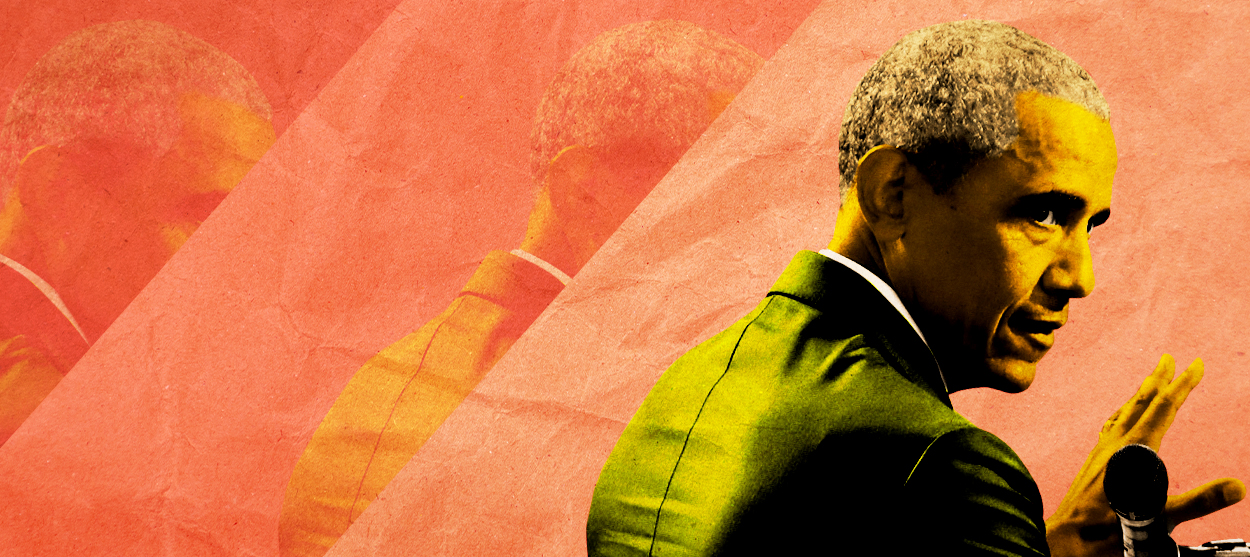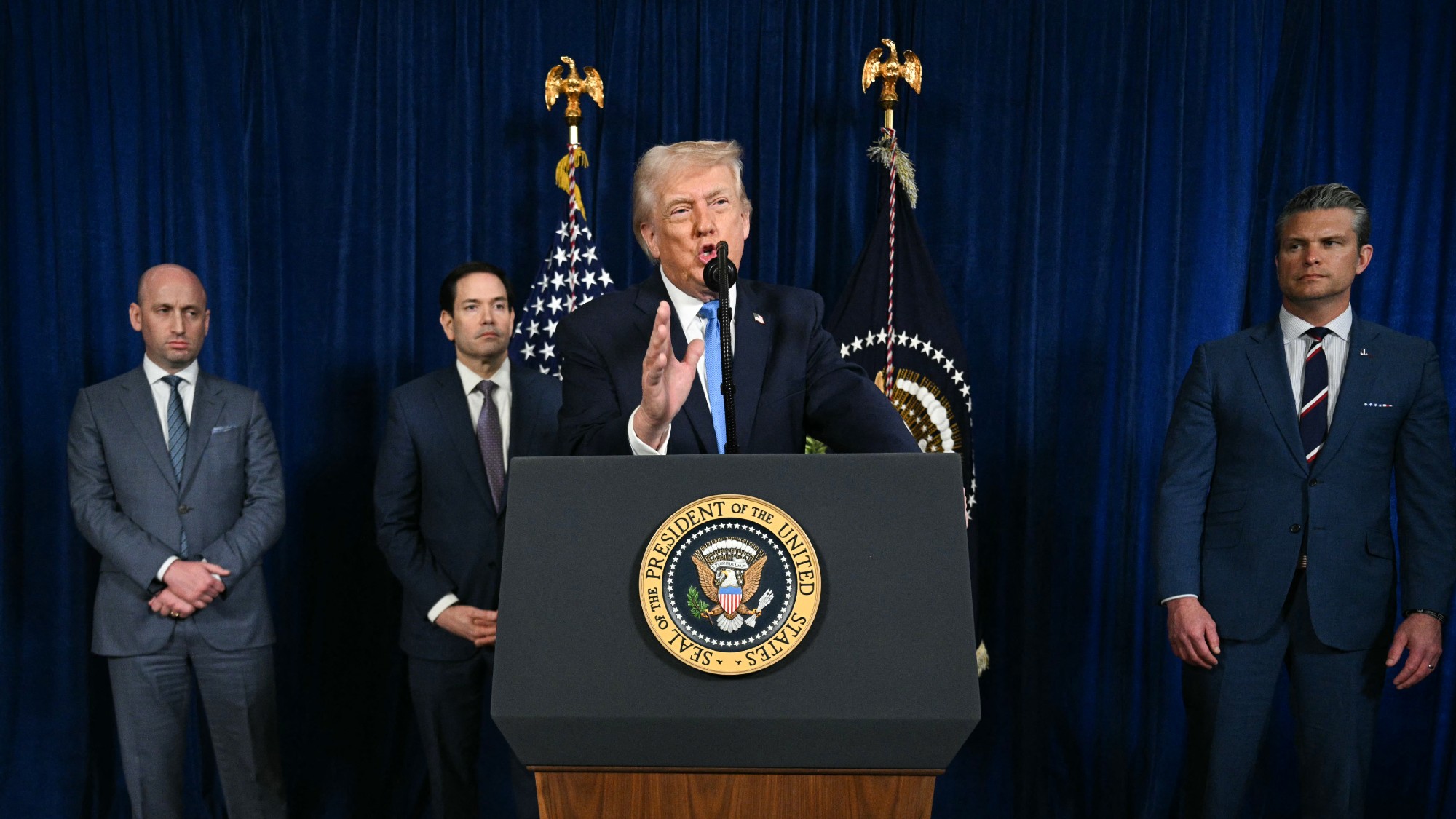Why Obama still drives Republicans nuts
His eulogy for John Lewis was typically soaring. The reaction on the right was furious.


A free daily email with the biggest news stories of the day – and the best features from TheWeek.com
You are now subscribed
Your newsletter sign-up was successful
Last week, a former president gave a speech in which he described the United States as a country dedicated to high ideals and striving to "form a more perfect union," and he called on Americans to support reforms that would help to ensure more equal representation for all. In response, members of the opposing party said that this former president was promoting "communist terrorist propaganda," and labeled him "cynical," "divisive and partisan," a "national disgrace," and "one of the sleaziest and most dishonest figures in the history of American politics."
I'm talking, of course, about Barack Obama's eulogy for civil rights icon John Lewis — and the unhinged reaction of right-wing journalists and media personalities to it. The context is what made that reaction so astonishing. We're three-and-a-half years into an administration defined by constantly dividing the country between those who support the current president and everyone else, who are often denigrated as haters and losers and "enemies of the people." More proximally, last week was one when Donald Trump suggested postponing the 2020 presidential election and promised (white) suburban voters that he would protect them from being "bothered" by poor people moving into their neighborhoods and lowering their property values. That was the context for Republicans taking offense at Obama for daring to suggest that "we can do better."
The eulogy never mentioned present-day Republicans. It included no reference to President Trump by name. Yet the reaction on the right to Obama was furious — just as it was during the entirety of his two-term presidency.
The Week
Escape your echo chamber. Get the facts behind the news, plus analysis from multiple perspectives.

Sign up for The Week's Free Newsletters
From our morning news briefing to a weekly Good News Newsletter, get the best of The Week delivered directly to your inbox.
From our morning news briefing to a weekly Good News Newsletter, get the best of The Week delivered directly to your inbox.
The contrast with how much of the right responds to Bernie Sanders is instructive. By every measure, Sanders is more ideologically radical than Obama and therefore much further away from the Republican Party on policy. Yet he doesn't inspire rage on the right like Obama does (or as the triangulating Bill Clinton did before him). Now, during the Democratic primary this was undoubtedly in part a result of a political calculation that Sanders getting the nomination would be good for the GOP in the general election. The right would surely have hit him relentlessly if he'd ended up becoming the Democratic nominee. And they would have done so even though Sanders' singular focus on economic issues makes him more difficult to engage in the culture-war terms favored by the right. (In Trump's hands during a general-election contest, the term "socialism" would have gone far beyond economics to take on all kinds of cultural resonance.)
Yet the difference remains: Sanders doesn't provoke rage like Obama does. While some might point to race, I doubt those made apoplectic by a Black politician would be comparatively forgiving to a septuagenarian Jewish social democrat with a thick Brooklyn accent. Something else is going on, and I think it's that the right accepts that Sanders just pushes his factional agenda from the socialist left and doesn't presume to speak from outside of or above the partisan fray.
Obama, by contrast, doesn't know how to speak in any other rhetorical register than above and beyond the partisan fray. He invariably sounds reasonable, his tone fair-minded, objective. He speaks of the grand sweep of American history, renders Solomonic judgments, and looks down on the disputants on the field of battle, even as his proposals invariably advance the liberal-progressive side of the clashes taking place below him.
That is what drives — and has always driven — the right nuts about Obama. It's his supposed pretense to elevation, to speaking in dispassionate terms about "us," about what's morally righteous and true, and rendering sometimes severe moral judgments of his opponents. He's a master of using a rhetoric of elevation to ennoble himself and his allies while casting implicit moral aspersions on his political foes, whom he portrays as self-evidently dishonorable, all the while sounding as if he's merely reciting the indisputable facts of the case. His tone at all times is that of a disapproving parent: You should be ashamed of yourselves.
A free daily email with the biggest news stories of the day – and the best features from TheWeek.com
It's understandable that Republicans would dislike being talked to like this, especially when it proved so politically effective from 2008 to 2016. But the ferocity of the response cries out for a fuller explanation — and we find one in the distinction between the politics of democracy and the politics of populism.
The politics of democracy is a contest to win the greatest number of votes — a plurality; or even better, a bare majority; and best of all, an overwhelming majority. This aim is what drove politics in this country through most of the 20th century. In the primaries, candidates sought out the sweet spot within their own parties, whether through winning support from party insiders — or, with the reforms that began after 1968, through winning the votes of party members in state primary and caucus elections. But in the general election, the two sides competed to find the center of public opinion in the country as a whole.
Each party's presidential ticket did this by making a pitch for the whole: This is how I see America. This is what I think of our ideals, our history, our actions in the past and present, and our destiny moving forward into the future. The candidate who got the most people to endorse his comprehensive vision of the nation would win the presidency, with the victor usually earning a majority of the popular vote, and sometimes an overwhelming majority, as happened in 1964, 1972, and 1984.
But as the GOP vote share in national elections has declined (since 1988, the Republican nominee has won a majority of the popular vote in a presidential contest only once, in 2004, and then with just 50.7 percent), the party has moved away from trying to win the presidency by receiving the most votes in favor of trying to generate incredibly intense support among its own party members, dividing the opposition, and prevailing through a counter-majoritarian outcome in the Electoral College. George W. Bush experimented with this approach in his re-election bid, but it is Trump who deployed it to greatest effect in 2016, and who has governed that way since taking office.
It's the politics of populism that provides the rationale and playbook here. Populism differs from democratic majoritarianism in treating only some of the people — one's own supporters — as the real people. Those who vote for the Republican are the true Americans. Those who oppose the Republican are false or fake Americans.
This approach to gaining and holding power can be remarkably effective in the right political circumstances. But it is vulnerable to a moral critique because it actively pursues the exercise of political rule by appealing to a part of the country rather than the whole of the country. That's why, when someone of Barack Obama's stature speaks eloquently in the name of a greater and broader democratic, majoritarian whole, it stings.
Interestingly, the Republican response to such criticism isn't a pledge to broaden its appeal but an angry denial of the criticism's moral gravity based on a furious effort to denigrate the messenger — to reduce the critic to the same level of partisanship, to deny his elevation and pull him down to the same moral level of the populist. (One could imagine them inverting an old line from the Obama years: "When they go high, we go low.") The goal is to demonstrate that both sides are equally ruthless in the pursuit of power, except that the left cloaks its ruthlessness in high-minded but thoroughly dishonest moral appeals.
That's the low ground on which Republicans think they can compete and win. Which is why their surest path to victory necessitates that they deny the possibility of elevation altogether.
That's also why Democrats need to follow Obama's example and keep aiming higher — and broader, electorally. In striving to speak for more of the country than present-day Republicans, Democrats validate their aspiration to speak also for what's right for the country, and to lead the effort to make it better and more perfect — and to expose their opponents' efforts to do the reverse.
Damon Linker is a senior correspondent at TheWeek.com. He is also a former contributing editor at The New Republic and the author of The Theocons and The Religious Test.
-
 What is the endgame in the DHS shutdown?
What is the endgame in the DHS shutdown?Today’s Big Question Democrats want to rein in ICE’s immigration crackdown
-
 ‘Poor time management isn’t just an inconvenience’
‘Poor time management isn’t just an inconvenience’Instant Opinion Opinion, comment and editorials of the day
-
 Bad Bunny’s Super Bowl: A win for unity
Bad Bunny’s Super Bowl: A win for unityFeature The global superstar's halftime show was a celebration for everyone to enjoy
-
 House votes to end Trump’s Canada tariffs
House votes to end Trump’s Canada tariffsSpeed Read Six Republicans joined with Democrats to repeal the president’s tariffs
-
 How are Democrats trying to reform ICE?
How are Democrats trying to reform ICE?Today’s Big Question Democratic leadership has put forth several demands for the agency
-
 Is Alex Pretti shooting a turning point for Trump?
Is Alex Pretti shooting a turning point for Trump?Today’s Big Question Death of nurse at the hands of Ice officers could be ‘crucial’ moment for America
-
 Halligan quits US attorney role amid court pressure
Halligan quits US attorney role amid court pressureSpeed Read Halligan’s position had already been considered vacant by at least one judge
-
 House approves ACA credits in rebuke to GOP leaders
House approves ACA credits in rebuke to GOP leadersSpeed Read Seventeen GOP lawmakers joined all Democrats in the vote
-
 The billionaires’ wealth tax: a catastrophe for California?
The billionaires’ wealth tax: a catastrophe for California?Talking Point Peter Thiel and Larry Page preparing to change state residency
-
 What is the Donroe Doctrine?
What is the Donroe Doctrine?The Explainer Donald Trump has taken a 19th century US foreign policy and turbocharged it
-
 Vance’s ‘next move will reveal whether the conservative movement can move past Trump’
Vance’s ‘next move will reveal whether the conservative movement can move past Trump’Instant Opinion Opinion, comment and editorials of the day
